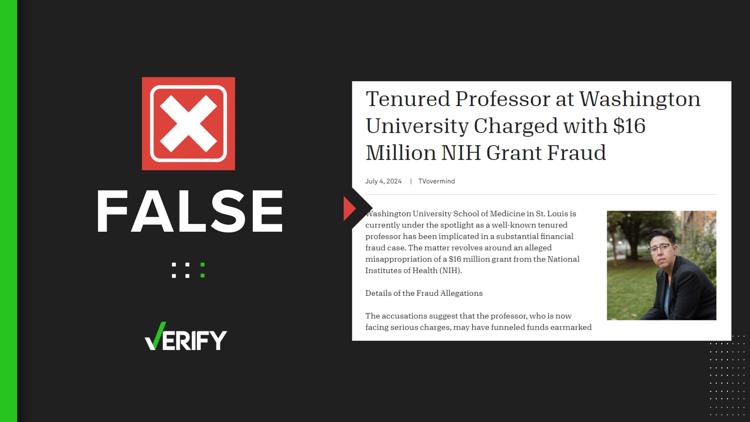ST. LOUIS — An email from a 5 On Your Side viewer sent us down an international disinformation rabbit hole.
"I’m surprised YOU are not writing about this important story," the email said while including a link to a Philanthropy News Digest article.
The article, pulled from a website called TVOvermind, claimed a tenured Washington University School of Medicine professor was facing federal charges for misappropriating a $16 million grant from the National Institutes of Health.
The issue is the entire story is fake confirmed by TVOvermind, the Lithuania-based website that originally published the article.
No professor from Washington University was involved in the fraud charge. A professor was charged with federal grant fraud, but they were a professor at the City College of New York. The article's lead image is of a University of Texas chairwoman.
"We have removed our article about this, to avoid any inconsistencies," TVOvermind told 5 On Your Side in an emailed statement.
The article's author, named Steve Delikson, adds another layer of suspicion to the story. He has no social media accounts and appears in no links outside of TVOvermind when his name is put into a search engine. Additionally, the journalist tracking website MuckRack, attributes thousands of articles to Delikson, all of which were uploaded to TVOvermind over a period of a few days.
"Steve Delickson does not appear to meet our strict criteria for verification," a Muckrack representative said. "Steve does not work for a verifiable outlet because TVOvermind does not produce reliable news and does not appear to be completely journalistically operated according to review by our editorial team."
TVOvermind attributed the article to a freelance author.
"It was a mess up by my freelance part-time writer, between the name of institution, that I quickly corrected, and even removed the article," TVOvermind said in an emailed statement to 5 On Your Side.
This incident is another in a long line of recent examples of real-looking fake news stories, a growing, global existential threat to journalism. Researchers from MIT found that fake news stories spread 70% faster than real news stories, with corrections only getting a fraction of the traction. The problem has gotten worse over the past decade, helped by a growing prevalence of AI-written articles and outrage becoming the key factor in going viral on search engines and social media platforms, according to social psychologist Jonathan Haidt.
Media literacy expert Julie Smith previously told 5 On Your Side that there are tried and true questions she always tells consumers to consider when reading articles, including:
- Who is the sender of this message?
- What is their motive or intent?
- How is the message designed to get my attention?
- What information is left out?
- Who benefits or profits from this?
Top St. Louis headlines
Get the latest news and details throughout the St. Louis area from 5 On Your Side broadcasts here.



